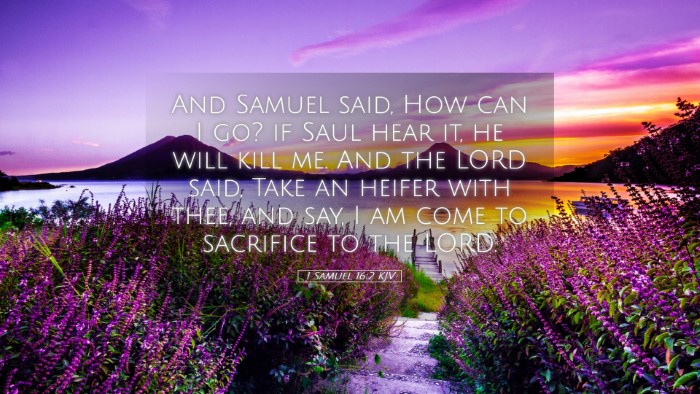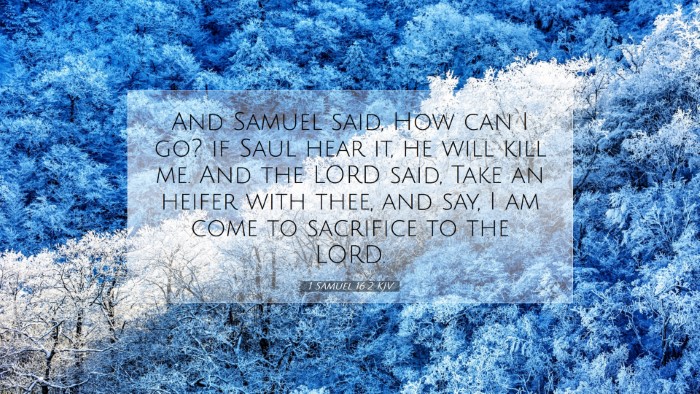Commentary on 1 Samuel 16:2
Verse: "And Samuel said, How can I go? If Saul hear it, he will kill me. And the Lord said, Take an heifer with thee, and say, I am come to sacrifice to the Lord."
Introduction
1 Samuel 16:2 marks a pivotal moment in the narrative of Israel's monarchy. This verse encapsulates the fear and obedience of the prophet Samuel as he grapples with divine instructions amidst political tension. The commentary that follows seeks to provide a multi-faceted understanding of this scripture, drawing upon the insights of notable public domain commentators.
The Context of 1 Samuel 16
This chapter occurs after Saul's rejection by God as king due to his disobedience (1 Samuel 15). God's directive to Samuel to anoint a new king indicates a shift in divine favor that has significant implications for Israel's future. Samuel's reluctance reflects the tension between fidelity to God's command and the realities of earthly powers.
Matthew Henry's Insights
According to Matthew Henry, Samuel's fear was not unfounded; Saul, feeling threatened, might resort to violence against those perceived as opponents. Henry emphasizes Samuel's dual role as a prophet and a patriot, caught between God's commands and the state of the nation. He notes:
- Fear of Authority: Samuel's fear underscores the real danger prophets faced in times of political upheaval.
- Divine Assurance: God provides a pragmatic solution by instructing Samuel to perform a sacrifice, allowing him to navigate his circumstances without compromising his prophetic duty.
Albert Barnes’ Analysis
Albert Barnes provides a more detailed exploration of Samuel's conflict. He discusses the implications of Saul's potential wrath and highlights how God’s instructions serve to facilitate a careful approach to anointing the next king. Some significant points include:
- God’s Provision: Barnes points out that God not only commands but also equips Samuel with the means to carry out His will safely.
- Symbolism of Sacrifice: The heifer symbolizes a rite of worship and serves as a cover for Samuel's clandestine mission.
Adam Clarke’s Commentary
Adam Clarke brings theological emphasis to the text, noting how God’s sovereign plan unfolds amidst human fear and political circumstances. Clarke elaborates on several important themes:
- Obedience Over Fear: Clarke stresses that despite Samuel's fear, obedience to God's command reflects faith in God's plan.
- Political Maneuvering: The act of sacrificing is portrayed not just as ritualistic but as a strategic move within the socio-political landscape.
Theological Implications
This verse raises several theological points worthy of deeper examination:
- God’s Sovereignty: The unfolding of events showcases God’s control, even when human leaders act in fear.
- Divine Calling: Samuel’s experience reflects the broader theme of God calling individuals to act in faith, despite personal risk.
- Worship as a Covering: The sacrifice may also serve to remind us of the importance of worship in discerning God’s will amidst fear and uncertainty.
Practical Applications
For pastors, students, and theologians, several practical applications arise from this verse:
- Leadership in Crisis: Samuel models how to navigate leadership in the face of opposition and fear.
- Faithfulness to God's Word: The imperative of following God's call, despite the potential for personal consequence, resonates powerfully in various contexts today.
- The Role of Worship: Worship acts as both a personal and communal act of obedience, providing strength to face challenges.
Conclusion
1 Samuel 16:2 is a profound illustration of the complexities of obeying divine instruction under pressure. Insights from public domain commentators like Matthew Henry, Albert Barnes, and Adam Clarke enrich our understanding of this passage, offering relevant reflections for contemporary readers. As we consider Samuel's moment of fear, we are invited to reflect on our own responses to God’s calls in the midst of uncertainties and challenges.


